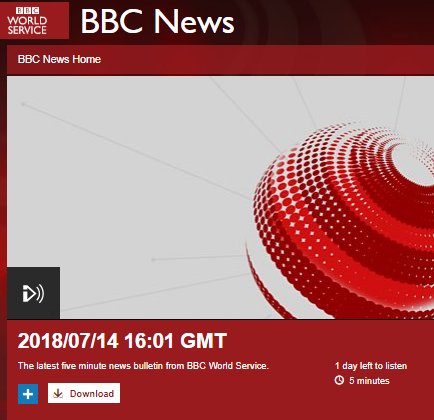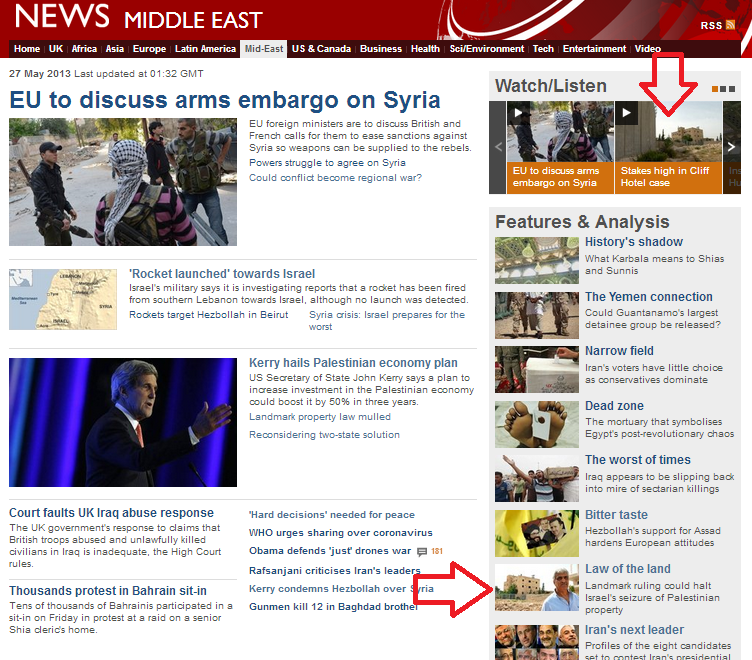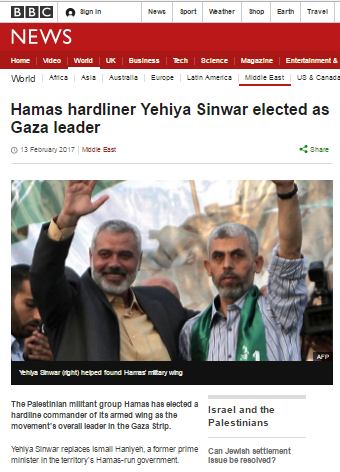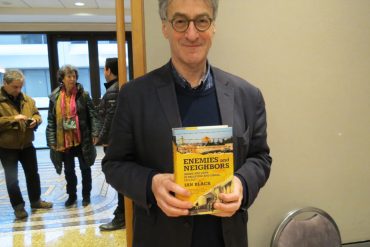From 4 p.m. GMT on the afternoon of July 14th BBC World Service news bulletins led with reports on the day’s events in the Gaza Strip and – to a lesser extent – southern Israel.
A number of recurring themes can be seen in the reports heard by BBC World Service listeners over a period of nearly eight hours:
1) Leading with and focusing on events in Gaza, with concurrent events in Israel mentioned later.
2) Quoting “Palestinian health officials” while failing to clarify that they are actually members of the same terror group organising the months of violent rioting along the border and launching missile attacks.
3) Using the euphemism “militant” in place of the term terrorist.
4) Quantifying the number of Israeli strikes on Hamas targets – e.g. “dozens” – while failing to quantify the terror groups’ rocket and mortar attacks.
5) Qualifying descriptions of Palestinian attacks as terrorism.
[emphasis in italics in the original, emphasis in bold added]
BBC World Service news bulletin 16:00 GMT 14/7/18
Debbie Russ: “The Israeli military says it has launched a wave of airstrikes against dozens of militant targets in the Gaza Strip as shells and rockets were fired into Israel from the Palestinian territory. Palestinian health officials say that two people have been killed and 12 more wounded by an airstrike in Gaza City. Israel says it’s destroyed a battalion headquarters belonging to Hamas.”
In the next bulletin (and a later one) listeners were told that the Israeli strikes were “against Gaza” rather than against a terror group’s military infrastructure alone.
BBC World Service news bulletin 16:30 GMT 14/7/18
Debbie Russ: “Israel has carried out one of its biggest operations against Gaza hitting dozens of militant targets, among them a Hamas battalion headquarters. The operation followed shell and rocket fire into Israel. The Palestinians say at least two people have been killed. The Israelis have reported three people injured on their side of the border.”
While a Hamas training facility was mentioned in several bulletins, the BBC presented its purpose as an Israeli claim, failing to inform audiences in its own words of the function of the building despite the information being available in a video produced by Hamas itself. The categorisation of IED attacks and a grenade attack as terrorism was repeatedly unnecessarily qualified.
BBC World Service news bulletin 17:00 GMT 14/7/18
Debbie Russ: “The Israeli military has launched a wave of airstrikes against dozens of militant targets in the Gaza Strip in retaliation for mortar and rocket fire into Israel from the Palestinian territory. Israel says it destroyed a training facility belonging to the militant group Hamas in one of its most wide-ranging operations there since the war of 2014. Here’s more from Tom Bateman in Jerusalem.”
Bateman: “Israeli fighter jets bombed a high-rise building in the Shati refugee camp in the northern Gaza Strip. Israel said the building was a training facility for the militant group Hamas. Israel said the wave of airstrikes on Saturday was in response to what it called terror acts at the perimeter fence on Friday and rocket and mortar fire from Gaza. Health officials in Gaza said two Palestinian teenagers were killed in the airstrikes, describing them as passers-by to a building that was targeted. Paramedics in the Israeli town of Sderot said three civilians were wounded from shrapnel after a rocket hit a house.”
BBC World Service news bulletin 17:30 GMT 14/7/18
Debbie Russ: “Israel has carried out one of its biggest operations against Gaza since the last war, hitting dozens of militant targets – among them a Hamas training facility. The series of airstrikes followed shell and rocket fire into Israel. The Palestinians say at least two people have been killed. The Israelis say three people were injured on their side of the border.”
BBC World Service news bulletin 18:00 GMT 14/7/18
Debbie Russ: “The Israeli military has launched a wave of airstrikes against dozens of militant targets in the Gaza Strip in retaliation for mortar and rocket fire into Israel from the Palestinian territory. It’s one of the most wide-ranging operations there since the war of 2014. Tom Bateman is in Jerusalem.”
Bateman: “Israeli fighter jets bombed a high-rise building in the Shati refugee camp in the northern Gaza Strip. Israel said the building was a training facility for the militant group Hamas. Israel said the wave of airstrikes on Saturday was in response to what it called terror acts at the perimeter fence on Friday and rocket and mortar fire from Gaza. Health officials in Gaza said two Palestinian teenagers were killed in the airstrikes, describing them as passers-by to a building that was targeted. Paramedics in the Israeli town of Sderot said three civilians were wounded from shrapnel after a rocket hit a house.”
While the two people killed in Gaza were described as “teenagers”, the fact that two of the Israelis wounded were also in that age-group was not communicated to listeners. After those two mentions of the fact that the injuries came as a result of a rocket attack on the family’s house, that information was excluded from subsequent bulletins.
BBC World Service news bulletin 19:00 GMT 14/7/18
Stewart Macintosh: “Israel has carried out its biggest air attack against militant targets in the Gaza Strip since the last war there in 2014. At the same time, mortars and rockets have been fired into Israel from the Palestinian territory, which is controlled by the militant group Hamas. Palestinian health officials say two teenagers have been killed and at least 15 more people wounded. The Israeli ambulance service says that three Israelis have been injured by shrapnel. Our Middle East regional editor Sebastian Usher has this assessment.”
Usher: “This is a serious escalation and there are attempts being made – Egypt, the UN – to try to talk both sides away from a direct confrontation. Remember, in the last decade there’ve been three wars in Gaza. Both sides are saying at the moment that’s not what they want but this is beginning to get dangerously out of control if it continues at this pace and if the casualties begin to mount.”
Notably Usher did not clarify that those “three wars” also took place in Israel.
BBC World Service news bulletin 20:00 GMT 14/7/18
Stewart Macintosh: “Benjamin Netanyahu has said the Israeli air force has carried out its biggest attack against militant targets in the Gaza Strip since the last war there in 2014. The Israeli prime minister said the raids were a response to terrorist actions by Hamas, from whose territory rockets and mortars had been fired into Israel. More details from Tom Bateman in Jerusalem.”
Bateman: “Israeli fighter jets bombed a high-rise building in the Shati refugee camp in the northern Gaza Strip. Israel said the building was a training facility for the militant group Hamas. Israel said the wave of airstrikes on Saturday was in response to what they called terror acts at the perimeter fence on Friday and rocket and mortar fire from Gaza. Health officials in Gaza City said two Palestinian teenagers were killed in the airstrikes. Paramedics in the southern Israeli town of Sderot said three civilians were wounded from shrapnel.”
BBC World Service news bulletin 21:00 GMT 14/7/18
Stewart Macintosh: “Palestinian officials say Israel and militant groups in Gaza have agreed a ceasefire. The announcement by a Hamas spokesman comes after the Israeli prime minister Benjamin Netanyahu said the Israeli air force had carried out its biggest attack against militant targets in the Gaza Strip since the last war there in 2014.
Voiceover: In consultation with the Minister of Defence, the Chief of Staff and the top security command of the State of Israel, we have decided a strong action against Hamas terrorism. The IDF have struck Hamas with the hardest blow since Operation Protective Edge and we will increase the strength of our attacks as necessary.
He said the raids were a response to what he called terrorist actions by Hamas from whose territory rockets and mortars have been fired into Israel.”
BBC World Service news bulletin 21:30 GMT 14/7/18
Stewart Macintosh: “Palestinian officials say Israel and militant groups in Gaza have agreed a ceasefire. The announcement comes after the Israeli prime minister said the Israeli air force had carried out its biggest attack against militant targets in the Gaza Strip since 2014. Benjamin Netanyahu said it was in response to what he called terrorist actions by Hamas. Two Palestinians were reportedly killed and three Israelis were injured.”
BBC World Service news bulletin 22:00 GMT 14/7/18
Stewart Macintosh: “Palestinian officials say Israel and militant groups in Gaza have agreed a ceasefire. The announcement by a Hamas spokesman comes after the Israeli prime minister Benjamin Netanyahu said the Israeli air force had carried out its biggest attack against militant targets in the Gaza Strip since the last war there in 2014. More from Tom Bateman in Jerusalem.”
Bateman: “Israeli fighter jets bombed a high-rise building in the Shati refugee camp in the northern Gaza Strip. Israel said the building was a training facility for the militant group Hamas. Israel said the wave of airstrikes on Saturday was in response to what it called terror acts at the perimeter fence on Friday and rocket and mortar fire from Gaza. Health officials in Gaza City said two Palestinian teenagers were killed in the airstrikes. Paramedics in the southern Israeli town of Sderot said three civilians were wounded from shrapnel.”
BBC World Service news bulletin 22:30 GMT 14/7/18
Stewart Macintosh: “A spokesman for the Palestinian militant group Hamas says a truce has been agreed with Israeli forces after the latest round of clashes in Gaza. However, Israel has said only the facts on the ground would dictate its action. The Israeli prime minister said the attacks against militant targets in the Gaza Strip were a response to what he called terrorist actions by Hamas.”
The first time listeners heard quantification of the missile attacks was seven hours after the story became the lead item.
BBC World Service news bulletin 23:00 GMT 14/7/18
Stewart Macintosh: “Palestinian officials say Israel and militant groups in Gaza have agreed a ceasefire. The announcement from a Hamas spokesman comes after the Israeli prime minister Benjamin Netanyahu said the Israeli air force had carried out its biggest attack against militant targets in the Gaza Strip since the last war there in 2014. From Jerusalem, here’s Tom Bateman.”
Bateman: “An Israeli airstrike on a building in Gaza City sent plumes of dust and smoke into the afternoon sky. Palestinian health officials said two teenagers were killed, describing them as passers-by when the building was hit. In what amounted to a significant military flare-up, Israel said it targeted 40 sites used by the militant group Hamas while nearly 200 mortars and rockets were reportedly fired from Gaza. Three Israelis were wounded from shrapnel in the town of Sderot. Late in the evening Hamas said it had agreed a ceasefire. Israel said only the facts on the ground would dictate its actions.”
BBC World Service news bulletin 23:30 GMT 14/7/18
Stewart Macintosh: “The Palestinian militant group Hamas says it agreed a truce with Israel after the latest round of clashes in Gaza. However Israel has said only the facts on the ground would dictate its action. The Israeli premier said the attacks against militant targets were a response to what he called terrorist actions by Hamas.”
By midnight GMT the story was no longer the first item in the bulletin. Remarkably, only then did listeners hear of the events which sparked the flare-up, although Bateman failed to clarify that the “15 year-old boy” was climbing the border fence when shot.
BBC World Service news bulletin 24:00 14/7/18 – from 00:57
Stewart Macintosh: “The latest reports from Gaza suggest Palestinian militants and Israeli forces are continuing to exchange fire despite an earlier announcement by Hamas that the two sides had reached a truce. Israel’s military said on Saturday it had carried out its biggest attack against militant targets in the Gaza Strip since the last war there in 2014 as Tom Bateman reports from Jerusalem.”
Bateman: “The latest round of hostilities took place amid the simmering tensions at Gaza’s perimeter fence. On Friday Israeli soldiers shot dead a 15 year-old boy, bringing to more than 130 the number of Palestinians killed during regular protests. An Israeli soldier was wounded by a grenade thrown from the fence which appeared in part to trigger the latest airstrikes alongside growing pressure on Mr Netanyahu to respond to daily arson attacks from the Strip involving burning objects attached to kites and helium filled condoms.”
As we see the majority of those BBC World Service news bulletins began by describing Israeli actions, with considerable focus on the theme of the “biggest attack” since 2014. Listeners were not told whether or not the rocket and mortar fire from the Gaza Strip was also the ‘biggest’ since that date.
It is of course difficult to imagine that the BBC would describe groups responsible for firing 200 projectiles in 24 hours into British territory as “militants”: as we have seen in the past the BBC does use the word ‘terror’ to describe attacks on British and European soil. Nevertheless, the double standard employed by the BBC in language when reporting terrorism continues.




